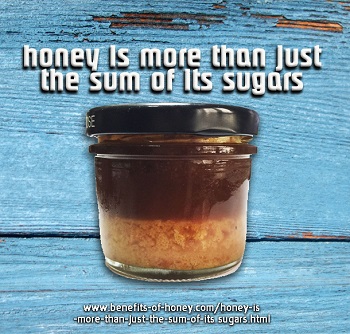
Honey Is More Than Just the Sum of its Sugars
~Food Is More Than Just the Sum of its Nutrients
As most honey lovers already know, honey is a highly concentrated, unstable natural sugar solution which separates into two sugar layers - white sugary layer (glucose) and dark liquid layer (fructose) during crystallization. We have received notes from health-conscious folks who say they prefer getting crystallized honey and believe that they could achieve healthier eating by removing the glucose layer of crystallized honey and consuming just the liquid fructose. What do you think? Do you agree? Such a food choice is based on the understanding that fructose has a lower glycemic index (GI) and thus would be more slowly absorbed and metabolized, and cause a slower rise in blood glucose.
Honey Isn't Just Fructose and Glucose
Honey is not equivalent to just fructose plus glucose. The health effects of taking just the fluid part wouldn't be the same as taking honey. Food is not just the sum of its nutrients. We eat whole foods, not nutrients. So, likewise, honey isn't just the sum of its sugars - fructose and glucose. We consume honey, and along with all its enzymes, minerals, vitamins, phenolic acids and flavonoids, and not just glucose or fructose.

Don't Fuss Over Specific Nutrients
We often hear these remarks, "You ought to eat more oranges for your skin as they are rich in vitamin C", "I'm adding more carrots into the soup as they are high in vitamin A", "Starches and sugars are damaging to your body so cut them out from your diet entirely", "If you want to lose weight, avoid nuts as they are high in fat and calories", etc. Evaluating food choices by fussing over specific nutrients misses the idea of eating nutritious whole foods and could lead to diet imbalance.
Distinguish Good Foods From Bad Foods
Dietary recommendations should be based on choosing specific good foods over bad ones and not focused on percentages, grams and milligrams of specific nutrients in a particular food (May 2017, American Journal of Clinical Nutrition). For instance, carbohydrates include nutritional choices such as whole grains and legumes but also highly processed foods with little or no nutritional value.
In the same vein, just targeting fructose alone not only promotes worthy choices such as fruits and vegetables but also a myriad of undesirable choices such as refined starches and beverages sweetened with high fructose corn syrup. Not all sugars are created equal, thus, simply cutting sugars in your diet doesn't help to distinguish good sugars from bad sugars that have zero nutritional value and could cause metabolic disorders.
Don't just assess honey based on its individual nutrients, but view it as a whole, as part of one's diet, together with other foods in the meal and consider its synergistic effects with other foods eaten at the same time. And once again, I like to mention my favourite personal quote about why honey is so special:
"I believe the best labs can create synthetic liquids that look and taste like real honey and even have the same glucose-fructose molecular structure, but NEVER can they fake something that works the same as real honey for our health and well-being. Because the bees have added a MYSTERIOUS GOODNESS of their own that can never be comprehended by the most ingenious mind or counterfeited by the most advanced technology." ~ Ruth Tan
End of Honey Is More Than Just the Sum of its Sugars. Back to "Healthy Eating Confusions"